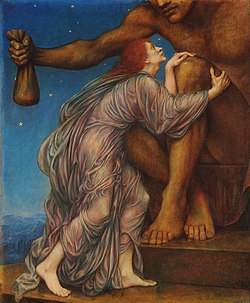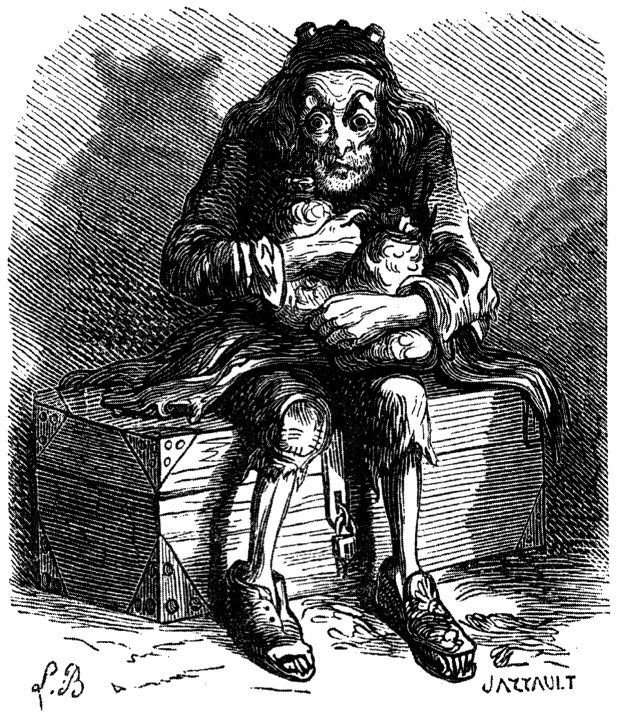| Revision as of 23:54, 2 April 2009 editRaquel Baranow (talk | contribs)Extended confirmed users3,336 editsm →Etymology: fixed ref← Previous edit | Revision as of 14:53, 3 April 2009 edit undoRaquel Baranow (talk | contribs)Extended confirmed users3,336 edits →Etymology: Aramaic definition of MammonNext edit → | ||
| Line 18: | Line 18: | ||
| </ref> <ref name="Webster">''Webster's Dictionary of the English Language Unabridged'': Publishers International Press, New York, 1977.</ref> | </ref> <ref name="Webster">''Webster's Dictionary of the English Language Unabridged'': Publishers International Press, New York, 1977.</ref> | ||
| Etymologically, the word is assumed to derive from Late Latin 'mammon', from Greek 'μαμμωνάς', Syriac 'mámóna' (riches), Aramaic 'mamon' (riches), probably from Mishnaic Hebrew 'ממון (mmôn = money<ref></ref>).<ref name="Winston" /><ref name="Webster" /> | Etymologically, the word is assumed to derive from Late Latin 'mammon', from Greek 'μαμμωνάς', Syriac 'mámóna' (riches), Aramaic 'mamon' (riches, money<ref>,'' Hastings, James, ed.;New York, Scribners, 1908-1921. 12 vols.</ref), probably from Mishnaic Hebrew 'ממון (mmôn = money<ref></ref>).<ref name="Winston" /><ref name="Webster" /> | ||
| The ] word for "Mammon", ''mamonas'', occurs in the ] (during the ]) and in the ] (] 16:9-13). The ] keeps the Syriac word. ] uses "richessis". | The ] word for "Mammon", ''mamonas'', occurs in the ] (during the ]) and in the ] (] 16:9-13). The ] keeps the Syriac word. ] uses "richessis". | ||
Revision as of 14:53, 3 April 2009
For other uses, see Mammon (disambiguation).Mammon is a term, derived from the Christian Bible, used to describe material wealth or greed, most often personified as a deity.

Definition
Webster's dictionary defines 'Mammon' as: 1) the false god of riches and avarice. 2) riches regarded as an object of worship and greedy pursuit; wealth as an evil, more or less personified. Winston defines it to mean: 1) wealth, worldly gain; 2) greed for riches; cupidity. Oxford defines: god of wealth, regarded as evil or immoral; 'those who worship mammon' = greedy people who value money too highly.
Etymology
Mammon is a term that was used to describe greed, avarice, and unjust worldly gain in Biblical literature. It was personified as a false god in the New Testament. The term is often used to refer to excessive materialism or greed as a negative influence. Adjectival forms are mammonish and mammonistic
Etymologically, the word is assumed to derive from Late Latin 'mammon', from Greek 'μαμμωνάς', Syriac 'mámóna' (riches), Aramaic 'mamon' (riches, moneyCite error: A <ref> tag is missing the closing </ref> (see the help page).).
The Greek word for "Mammon", mamonas, occurs in the Sermon on the Mount (during the discourse on ostentation) and in the parable of the Unjust Steward (Luke 16:9-13). The Authorised Version keeps the Syriac word. John Wycliffe uses "richessis".
Personifications

Lay not up for yourselves treasures upon earth, where moth and rust doth corrupt, and where thieves break through and steal: But lay up for yourselves treasures in heaven, where neither moth nor rust doth corrupt, and where thieves do not break through nor steal: For where your treasure is, there will your heart be also. No one can serve two masters, for either he will hate the one and love the other; or else he will be devoted to one and despise the other. You can not serve both God and Mammon.
— Matthew 6:19-21,24
In the Bible, Mammon is personified in Luke 16:13, and Matthew 6:24, the latter verse repeating Luke 16:13. In some translations, Luke 16:9 and Luke 16:11 also personify mammon; but in others, it is translated as 'dishonest wealth' or equivalent. In some Spanish versions, it is said as "Mamón", but in others, as "Dinero" (Spanish for "money").
Early mentions of Mammon appear to stem from the personification in the Gospels, e.g. Didascalia, "Do solo Mammona cogitant, quorum Deus est sacculus"; and Saint Augustine, "Lucrum Punice Mammon dicitur" (Serm. on Mt., ii). Gregory of Nyssa also asserted that Mammon was another name for Beelzebub.
During the Middle Ages, Mammon was commonly personified as the demon of avarice, richness and injustice. Thus Peter Lombard (II, dist. 6) says, "Riches are called by the name of a devil, namely Mammon, for Mammon is the name of a devil, by which name riches are called according to the Syrian tongue." Piers Plowman also regards Mammon as a deity. Nicholas de Lyra (commenting on the passage in Luke) says: "Mammon est nomen daemonis" (Mammon is the name of a demon).
No trace, however, of any Syriac god of such a name exists, and the common literary identification of the name with a god of covetousness or avarice likely stems from Spenser's The Faerie Queene, where Mammon oversees a cave of worldly wealth. Milton's Paradise Lost describes a fallen angel who values earthly treasure over all other things. Later occultist writings such as De Plancy's Dictionnaire Infernal describe Mammon as Hell's ambassador to England. For Thomas Carlyle in Past and Present, the 'Gospel of Mammonism' became simply a metaphoric personification for the materialist spirit of the nineteenth century.
Mammon is somewhat similar to the Greek god Plutus, and the Roman Dis Pater, in his description, and it is likely that he was at some point based on them; especially since Plutus appears in The Divine Comedy as a wolf-like demon of wealth, wolves being associated with greed in the Middle Ages. Thomas Aquinas metaphorically described the sin of Avarice as "Mammon being carried up from Hell by a wolf, coming to inflame the human heart with Greed".
In various countries
- Mamona (sometimes Mamuna) is a synonym for Mammon in Slavic counries - demon described in New Testament as a demon of wealth and greed. Currently, the word mamona is used figuratively and derogatory in the Polish language as a synonym to money. This, however, has biblical origins, see Mammon.
- In Spanish culture, where Mammon is not so well known, the image used to criticize the love of wealth is the golden calf, idolized by the Israelites against the will of God.
See also
References
- ^ Webster's Dictionary of the English Language Unabridged: Publishers International Press, New York, 1977.
- ^ Winston Dictionary: John C Winston Company, Philadelphia, 1954.
- Oxford Advanced Learner's Dictionary: Oxford University Press, 1992.
- The Catholic Encyclopedia: An International Work of Reference on the Constitution, Discipline, Doctrine, and History of the Catholic Church, C. G. Herbermann, E. A. Pace, C. B. Pallen, T. J. Shahan, and J. J. Wynne, editors, pg. 580, "Mammon" by Hugh Pope. The Encyclopedia Press, New York, 1913.
- Select Notes on the International Sabbath School Lessons, F. N. Peloubet, W. A. Wilde and Company, Boston, 1880.
- becerro de oro in the Diccionario de la Real Academia Española.